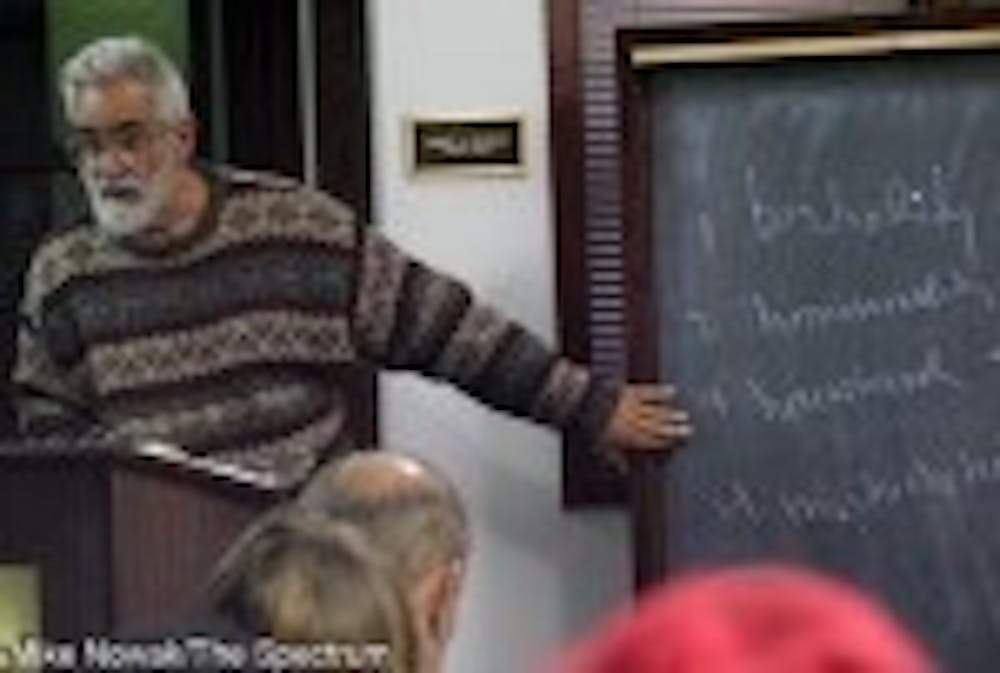Talking about sex is easy, at least with most college students. What's harder is having an honest, intellectually stimulating conversation about it.
"To do it or not to do it, that is the big question," Alan Soble, a research professor at New Orleans, said at his Tuesday night lecture at UB's Center for Inquiry.
The presentation, titled "The Conundrum of Sexual Morality: Where to Draw the Line?" focused on three distinct strains of philosophical thought about sex.
Soble's paraphrase of Hamlet illustrated the way each of these schools of thought seeks to resolve the central problem of human sexuality.
Soble, a prominent thinker in the field of human sexuality, made it clear that his goal was not to provide easy answers but rather to encourage introspection and public discourse.
"If I am at all successful, you will go away more confused than when you came in," he joked.
Throughout his speech, Soble did not downplay or advocate one set of ideas over another. Instead, he presented the pros and cons of each camp and left the ultimate decision of right or wrong to the audience.
According to Soble, St. Augustine, Thomas Aquinas and other medieval Christian theologians emphasized the negative aspects of sex. They believed that sexual intercourse, while undoubtedly a creation and a reflection of the will of God, can be sinful if used for the purpose of pleasure rather than reproduction.
"(According to Aquinas) the sole purpose of the penis was to ejaculate sperm into the vagina for procreation," Soble said. "Interference with the pro-creational potential is sin."
The 18th century French philosopher Marquis de Sade, however, rejected St. Augustine's message of procreation rather than recreation and championed sexual freedom.
"De Sade thought that everybody has a right to sex," Soble said. "If you have the ability to force or trick someone into having sex with you, you are perfectly justified. This ties into the notion of natural as 'red in tooth and claw.'"
Next, Soble explained the concept of free and informed consent as the middle ground between the two extremes, and he traced the origins of this idea to the works of philosophers John Stuart Mill and Immanuel Kant.
"Free and informed consent means that (sex) is voluntary and that there can't be deception involved," he said, before pointing out some potential problems with this principle.
"Suppose a guy meets a girl at a bar. He tells some lies or exaggerations to get her into bed with him. Is that a violation of free and informed consent?" he asks. "In order for the decision to have sex to be free, one has to be relaxed, calm and detached. But there is a Yiddish saying: when the penis gets erect the brain goes out the window."
Steven Halady, a graduate student in the philosophy department, said he found a lot to like about the speech.
"It covered a wide variety of perspectives," he said. "There were many complex ideas and he made them easily understood."
Adam Sparks, a sophomore mechanical engineering major, also said that he enjoyed the lecture though he disagreed with the professor on several points.
"He went over a lot of viewpoints, but he didn't let his own viewpoint get in the way," he said, "I didn't know anything about Marquis de Sade. I was surprised that the guy thought that anal sex is the way to go."
"I didn't agree with some of the problems with the free and informed consent. I think that the problems he brought up are kind of trivial," he added.
Iris Levine, a sophomore exercise science major, said that she was impressed by the speech.
"The lecture was fair and balanced. He used humor very well and exceeded my expectations," she said.
"The Conundrum of Sexual Morality: Where to Draw the Line?" kicks off the first of a series of five evening lectures on human sexuality by the New Orleans professor.
The next speeches will be held at the Center for Inquiry at 7 p.m. on Nov. 15, Nov. 22, Dec. 6 and Dec. 13.





